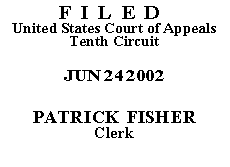

| BENITO JEROME BOWIE,
Plaintiff - Appellant, v. RON MITCHELL; ROBERT A. RAVITZ; CAROLYN RICKS; TIM WILSON; OKLAHOMA CITY POLICE DEPARTMENT; THE OKLAHOMA BAR ASSOCIATION; COUNCIL ON JUDICIAL COMPLAINTS, Defendants - Appellees. |
|
Plaintiff Benito Jerome Bowie appeals from the district court's order dismissing his civil rights complaint, which he brought pursuant to 42 U.S.C. § 1983. Bowie is currently serving life sentences for two first degree murder convictions. See Bowie v. State, 906 P.2d 759 (Okla. Crim. App. 1995) (affirming Bowie's conviction but reversing and remanding his death sentence in first degree murder of victim Eric Douglas Dunn); Bowie v. State, 816 P.2d 1143 (Okla. Crim. App. 1991) (affirming Bowie's conviction in first degree murder of victim Melvin Traylor). In this action, he sued a variety of persons involved in obtaining these convictions, including an investigating officer, two public defenders, and a presiding trial judge. He also sued various persons and agencies within the state of Oklahoma whose investigation of the conduct underlying his convictions proved unsatisfactory to him.
In a well-reasoned report and recommendation, a federal magistrate judge assigned to this case determined that all of Bowie's claims were barred under one or more of the following theories: failure to state a claim; absolute immunity (judicial and testimonial); Eleventh Amendment immunity; lack of standing; and the statute of limitations. He further declined to exercise jurisdiction over any state law claims stated in the complaint. The district court adopted the magistrate judge's report and recommendation and dismissed the complaint.
We review de novo the district court's dismissal of Bowie's complaint on each of the above theories. See, e.g., McDonald v. Kinder-Morgan, Inc., 287 F.3d 992, 997 (10th Cir. 2002) (failure to state a claim); Scott v. Hern, 216 F.3d 897, 908 (10th Cir. 2000) (absolute immunity); Joseph A. ex rel. Wolfe v. Ingram, 275 F.3d 1253, 1259 (10th Cir. 2002) (Eleventh Amendment immunity); Faustin v. City & County of Denver, 268 F.3d 942, 947 (10th Cir. 2001) (standing); Laurino v. Tate, 220 F.3d 1213, 1216 (10th Cir. 2000) (statute of limitations). Upon our review of the record, the briefs(1) and the applicable law pursuant to these standards, we have determined that Bowie's complaint was properly dismissed. The judgment of the United States District Court for the Western District of Oklahomais therefore AFFIRMED for substantially the same reasons articulated in the district court's order of dismissal dated July 3, 2001, and the magistrate judge's report and recommendation of May 14, 2001. The mandate shall issue forthwith.
Entered for the Court
Circuit Judge
*. This order and judgment is not binding precedent, except under the doctrines of law of the case, res judicata, and collateral estoppel. The court generally disfavors the citation of orders and judgments; nevertheless, an order and judgment may be cited under the terms and conditions of 10th Cir. R. 36.3.
1. Appellees filed a total of three response briefs. Two of these briefs were filed by individual parties. These parties were required by 10th Cir. R. 31.3(B) to provide "a certificate plainly stating the reasons why the separate brief is necessary." The Oklahoma Bar Association did not provide a certificate; however, it was excused from this requirement by Rule 31.3(D), which exempts government entities. Police Chief Berry's brief includes a 31.3(B) certificate, which simply states that a separate brief was necessary because the alleged liability of each defendant and the consequent dismissal were reached on a "different basis." Berry Resp. Br. at 12. None of these briefs even approached the page limit for an appellee's brief. We see no good reason why appellees could not have filed a single brief, and thereby spared this court the effort of reading three separate, repetitive appellees' briefs. See 10th Cir. R. 31.3(A).